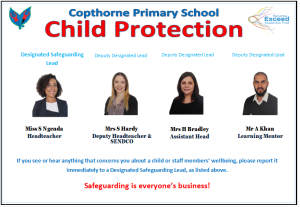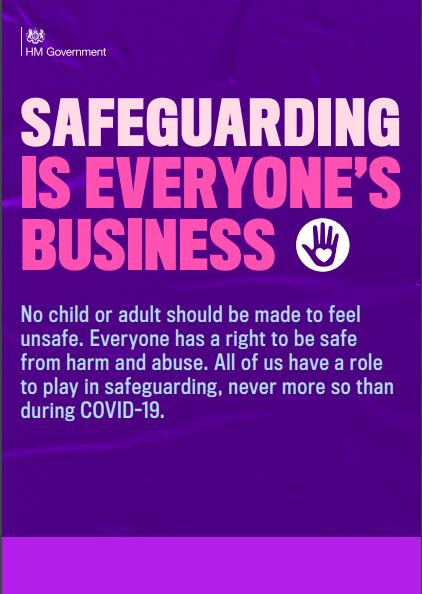

Copthorne Primary School fully recognises its responsibilities for child protection and safeguarding. We are committed to maintaining a safe learning environment for our children and, where there are child welfare concerns, we take action to address them.
Our Child Protection and Safeguarding policies and practise apply to all staff, governors and volunteers who work in our school. To view these policies please click on the Parents section of the menu bar above.
Our Safeguarding Governor is Emma Dobson.

If you are worried about online abuse or how someone is communicating
with you, let the CEOP know about it. Click here to report it.
Talking to children
Talking to my child provides advice for parents about how to maintain regular open communication with children.
Reporting Concerns
Use the links below to report harmful or upsetting content.
Report harmful online content to the UK Safer Internet Centre
Government Advice
Get government advice and trusted resources from Educate Against Hate on safeguarding from radicalisation, building resilience to extremism, and promoting shared values.
Advice to parents and carers on keeping children safe from abuse and harm. Gov.uk
Bullying or abuse online
Get advice on reporting online abuse from the National Crime Agency’s Child Exploitation and Online Protection command.
Get advice and support from Anti-Bullying Alliance for children who are being bullied.
Sexual Abuse and Harassment
Talking to your child about Online Sexual Harassment -A Guide for Parents
Online Safety
The sites below contain useful resources for parents and carers to keep their children safe online.
Childnet provides information about staying safe online in a range of languages including Arabic, Urdu, Polish and many others.
Bradford LA Online Safeguarding for Parents provides information about online behaviours, contact and measures to keep children safe.
DFE – Keeping Children Safe Online
Educate Against Hate offers advice on being safe online, how to respond to negative things seen online and tips for keeping your data secure.
Thinkuknow provides advice from the National Crime Agency (NCA) on staying safe online.
Parent info is a collaboration between Parentzone and the NCA providing support and guidance for parents from leading experts and organisations.
Thinkuknow 4-7 is designed to equip 4-7 year olds with the knowledge, skills and confidence to stay safer online.
Childnet offers a toolkit to support parents and carers of children of any age to start discussions about their online life, to set boundaries around online behaviour and technology use, and to find out where to get more help and support.
Internet matters provides age-specific online safety checklists, guides on how to set parental controls on a range of devices, and a host of practical tips to help children get the most out of their digital world.
London Grid for Learning has support for parents and carers to keep their children safe online, including tips to keep primary aged children safe online.
Net-aware has support for parents and carers from the NSPCC, including a guide to social networks, apps and games.
Let’s Talk About It has advice for parents and carers to keep children safe from online radicalisation.
UK Safer Internet Centre has tips, advice, guides and other resources to help keep children safe online, including parental controls offered by home internet providers and safety tools on social networks and other online services.
Parentzone continues to offer a range of resources on digital resilience and other curriculum areas, useful for parents and teachers.
What parents need to know about TikTok
Digital Literacy Resources
BBC Bitesize: Fact or Fake – lots of activities and resources related to fake news and COVID-19
ShoutOut UK – free weekly resources on online harms, conspiracy theories, how to spot fake news and deal with trolls.
Trust Me – primary and secondary lessons resources to explore critical thinking online.
Be Internet Citizens – lesson resources on fake news, hate speech, emotional manipulation.
BBC Evidence Toolkit – interactive software, lesson plans and teacher notes to review media stories.
BBC Real News – videos, lesson plans, podcasts related to digital literacy
National Literacy Trust – fake news and critical literacy resources, including lesson plans for different subject areas (pdfs can be found at the end of the page).
The News Literacy Project – resources to support pupils to understand what to trust in the digital age.
Fact Checkers
Infotagion – Fact checking in relation to COVID-19
Schools can access the free Professionals Online Safety Helpline which supports the online safeguarding of both children and professionals. Call 0344 381 4772 or email helpline@saferinternet.org.uk. The helpline is open from Monday to Friday from 10am to 4pm.
Click here to read ‘Safeguarding is Everyone’s Business’.
